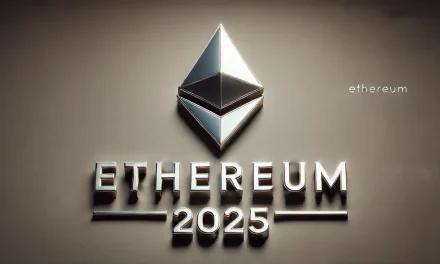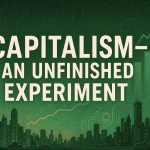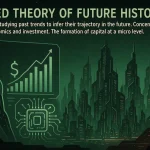Charting the Future of Capitalism Through History and Innovation
Capitalism has been the driving force behind industrial growth, technological innovation, and global prosperity for centuries. From its origins in early trade and mercantilism to the digital age’s disruptive technologies, the evolution of capitalism reflects humanity’s relentless pursuit of progress and wealth creation. As we look to the future, understanding the historical development of capitalism—its core principles, transformative moments, and recurring challenges—is essential for anticipating emerging trends in technology and investment.
Today’s capitalism is more interconnected and digitized than ever before, powered by groundbreaking innovations such as artificial intelligence, blockchain, and sustainable energy. These technological advancements are reshaping industries, redefining value creation, and presenting new opportunities for investors eager to capitalize on the future. Meanwhile, ongoing debates about global inequality, environmental sustainability, and regulatory frameworks underscore the need to reassess and adapt economic models for a rapidly changing world.
In this article series, we explore the historical trajectory of capitalism—its key thematic elements like technological disruption, societal change, and economic resilience—and extrapolate what these patterns might mean for the future. Through this lens, we aim to provide insights for investors, entrepreneurs, and technology enthusiasts interested in the transformative potential of capitalism in shaping a sustainable, innovative economic future.
Key Thematic Elements Shaping the Future of Capitalism
As capitalism continues to evolve, several thematic elements stand out as major drivers and challenges that will influence its trajectory in the coming decades. Among these, technological innovation, inequality, and globalization are particularly pivotal, intertwining to redefine economic paradigms, societal structures, and investment opportunities.
Technological Innovation
At the heart of capitalism’s past and future is technological advancement. The Industrial Revolution ushered in mechanization, transforming production and trade. Today, digital technologies—artificial intelligence, blockchain, robotics, and biotechnology—are revolutionizing industries, creating new markets, and displacing traditional roles. These innovations promise unprecedented efficiencies and new sources of value but also pose risks of disruption and unemployment. Futuristic investment strategies increasingly focus on tech-driven sectors that harness these developments, signaling a shift towards a knowledge- and innovation-centric economy.
Inequality and Social Dynamics
While capitalism has generated immense wealth, it has also exacerbated social inequalities. The concentration of capital and technological access often benefits a limited few, raising questions about inclusivity and social cohesion. In the future, discussions around wealth redistribution, universal basic income, and social safety nets are gaining prominence. The way capitalism addresses inequality will significantly influence political stability and consumer markets, determining whether growth benefits all or deepens societal divides.
Globalization and Interconnectivity
Globalization has expanded capitalism’s reach, enabling capital, goods, and ideas to flow across borders at unprecedented speeds. This interconnectedness has driven economic growth but also heightened vulnerabilities, as seen in supply chain disruptions and financial crises. Moving forward, geopolitical considerations, regional economic blocs, and digital connectivity will shape how capitalism adapts to a more integrated but complex world. Investment strategies will increasingly need to account for these geopolitical and technological interdependencies.
Expanding the Thematic Landscape: Long-Term Perspectives and the Science Fiction Theory
While immediate technological and societal shifts are critical, a comprehensive analysis of capitalism’s future must also consider longer-term, more speculative themes. As we confront the Earth’s resource limits—a concern increasingly evident with climate change, environmental degradation, and finite mineral supplies—it becomes plausible that humanity will look beyond our planet for sustainable resources and new economic frontiers. This perspective opens the door to visionary ideas such as space mining, off-world colonies, and extraterrestrial resource extraction, which could become vital components of future capitalism.
Planetary Resources and Space Economy
The concept of accessing resources from asteroids, moons, and planets aligns with the idea that Earth’s resources are effectively finite. Advancements in space technology, driven by both government agencies and private enterprises, suggest that off-planet investment and resource extraction may emerge as major sectors in the global economy. Such developments could redefine asset classes, investment strategies, and even notions of ownership and sovereignty—transforming the very fabric of capitalism.
The Science Fiction Theory
This long-term outlook is closely linked to what can be called the Science Fiction Theory: the idea that many science fiction concepts—once purely imaginative—will increasingly become scientific and technological reality. From artificial intelligence surpassing human cognition to human colonization of Mars, these visions challenge our understanding of what is possible. Today’s speculative narratives about interstellar travel, mind uploading, and advanced bioengineering could, within this century, form the basis of an expanded, interplanetary capitalist system.
Long-Term Risks and Opportunities
Looking further ahead, humanity might develop new ways to harness energy—from controlled fusion to solar power harvested in space. Ethical questions around bioengineering, transhumanism, and the integration of humans and machines will become intertwined with capitalism’s evolution. These themes prompt us to consider not just technological feasibility but also moral and societal implications, framing the future of economic systems within a speculative but increasingly plausible sci-fi landscape.
Conclusion: Embracing a Visionary Future of Capitalism
As we stand at the cusp of an era defined by rapid technological innovation, environmental constraints, and expanding horizons—both on Earth and beyond—we are invited to reimagine what capitalism can become. This is a time when science fiction no longer belongs solely to the realm of fantasy but is transitioning into the fabric of reality, fueling breakthroughs that could redefine human civilization.
For investors, entrepreneurs, and thinkers attuned to the currents shaping tomorrow, the opportunity lies not only in navigating today’s market dynamics but also in anticipating the long-term shifts that will mold the future. From harnessing the transformative power of artificial intelligence and blockchain to pioneering space resource extraction and sustainable biotech, the seeds of the next economic revolution are already being planted.
Yet, beyond immediate applications, there exists a vast frontier of possibility—where humanity’s drive for exploration, innovation, and transcendence might ultimately flourish. The Science Fiction Theory suggests that many visions we once regarded as speculative fiction may soon become our lived reality, creating an expanded, multi-planetary capitalist system and unlocking resources and capacities previously unimaginable.
Looking ahead, we must cultivate a sense of wonder and a willingness to think beyond conventional boundaries. We should watch for signs of technological breakthroughs, shifts in geopolitics, and societal adaptations that signal our progression toward these bold horizons. By embracing a future built on both practical investments and visionary exploration, we can position ourselves to thrive in a universe of infinite possibility.
In the end, the future of capitalism is not just about economic growth; it’s about human potential. It’s about daring to dream beyond limits, innovating at the edge of science, and preparing to shape a reality where the extraordinary becomes commonplace. Let this be an invitation to see our journey not only as investors and thinkers but as pioneers of a new chapter in human history—one that spans worlds and defines what it means to be truly boundless.









